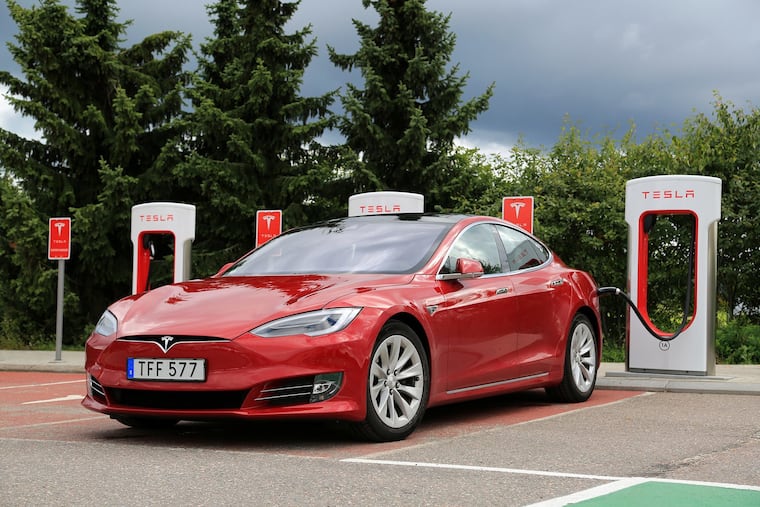Electric cars: Owned by few, subsidized by all | Opinion
Polling shows that EV subsidies are wildly unpopular. Most Americans don’t even want to give a nickel to pay for someone else’s car purchase.

Imagine one day that your rich friend Becky FaceTimes you from San Francisco to show off her brand-new luxury car. Congrats to Becky! She works hard for a living, and she earned that brand-new whip.
But then, when collecting your next paycheck, you notice Uncle Sam took part of your earnings to pay for Becky’s car. To make matters worse, the next time you go to fill up your 15-year-old sedan at the gas station, you notice an extra charge at the pump to help pay for Becky’s fuel.
That’s not a fair system, but it’s what’s happening with electric-vehicle subsidies.
Both federal and state governments have generous handouts for electric vehicles. The federal tax credit extends up to $7,500. Throw in state subsidies, and that figure can easily top $10,000.
Furthermore, utilities that stand to benefit from drivers plugging in for fuel are spending tens of millions of dollars on EV charging stations and billing the costs back to all ratepayers. And let’s not forget, EV drivers don’t pay any gas tax, which is literally highway robbery since the federal gas tax is supposed to pay for the interstate highway system.
» READ MORE: New Jersey needs more electric transit to fight climate change | Opinion
Who’s benefiting from this government-forced benevolence? The people who need help from other taxpayers and ratepayers the least. According to research from the University of California at Berkeley, 90% of the tax credits accrue to America’s top income quintile. A May 2019 Congressional Research Service report found that 78% of the tax credit’s recipients had an adjusted gross income of $100,000 per year or more.
As currently structured, the federal tax credit applies to the first 200,000 electric vehicles per manufacturer, and then a phaseout of the credit begins. Two automakers, Tesla and GM, reached that threshold and are in the phaseout stage.
Sen. Debbie Stabenow (D., Mich.) is leading the charge to extend a $7,000 tax subsidy for an additional 400,000 vehicles per manufacturer. Other policymakers want to lift the cap altogether and extend the tax credit permanently. Some iteration could wind up in a larger tax-extenders package.
The setup of the per-manufacturer cap reflects an “infant industry” justification: to help a new technology with some taxpayer-funded training wheels, then let it ride on its own. But the infant industry argument is bogus in the first place. As economist Milton Friedman said, “The so-called infants never grow up” because companies become dependent on the preferential treatment from Washington.
In addition, the market already provides plenty of economic opportunity for alternative fuel technologies. Collectively, Americans spend more than $300 billion per year on gas. Globally, both the electricity and the transportation-fuels markets are multitrillion-dollar markets. That’s more than enough incentive for an infant industry to turn into a giant (and quite quickly!) if they have a good product.
Any extension of the EV tax credit would be terrible for most American families. The extension would be massively expensive. The Stabenow extension alone could cost taxpayers as much as $16 billion over the next 10 years, according to a recent study by Ernst & Young.
Besides, having captive ratepayers cover the costs of recharging infrastructure through higher electricity bills for all ratepayers makes no sense. Some states are requiring utilities to put forth plans to do so. Proponents of such spending initiatives argue that consumers won’t buy EVs if they have no place to recharge them, thus creating a chicken-and-egg problem.
But economically viable technologies overcome the chicken-and-egg problem all the time. Consumers wouldn’t buy cell phones if there were no cellphone towers. Cell phones used to be a luxury item 20 years ago, and now more than 5 billion people own them. The same can happen with EVs and charging stations if automakers produce cars people want to buy without help from Washington.
Polling shows that EV subsidies are wildly unpopular, and the overwhelming majority of Americans don’t even want to give a nickel to pay for someone else’s car purchase. Extending the tax credit and increasing the cap would be an economic and political loser. Congress should pump the brakes on this cronyist handout that benefits the elite.
Nicolas Loris is deputy director of the Roe Institute for Economic Policy Studies and the Morgan Fellow in Energy and Environmental Policy at The Heritage Foundation (heritage.org). This piece was adapted from Tribune Content Agency.